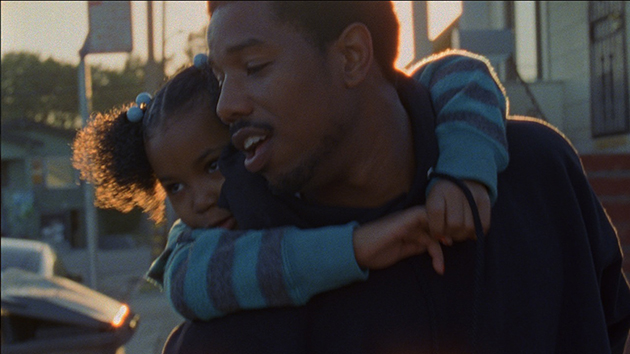Monday, July 29, 2013
FRUITVALE STATION (2013, Ryan Coogler)
Few directorial debuts have garnered as much attention as Ryan Coogler's Fruitvale Station, which won the top prize at Sundance as well as a huge amount of relevancy in the wake of the Trayvon Martin shooting. The film, which was just recently released nation-wide, tells the story of Oscar Grant, a young man who was unjustly shot by police early on New Year's Day. That is no spoiler, as the film assumes you know the story, which was national news a few years ago, and how the film markets itself as the last few hours in a man's life.
Dealing with such an intimate and real-life situation such as Oscar Grant's death requires a great amount of polished talent to make the story dramatic and interesting. Coogler just doesn't have it, although he certainly shows flashes of potential. Too often the film aims too low, and the first hour simply shows how nice of a guy Oscar Grant is. Sure, he was a drug dealer and was in prison, but he's over that! In a particularly ridiculous early scene, Grant pets a dog at a gas station, and moments later when the dog is hit by a car, we see Grant moan and cry. Coogler is prodding us to go "Look, he cried about a dog, how nice!" Coogler seems unconfident that an audience would accept a former convict as a nice guy, so he pads the film with all sorts of ridiculous scenes showing off how damn nice this guy is, bluntly telling us rather than showing anything. However, despite the weaknesses of the writer-director, Michael B. Jordan does a fairly good job, especially given his hokey material.
The cinematography is also a major issue, as Coogler and his D.P. resort to the current mark of current low-budget cinema- sloppy shallow focus. Fruitvale may be a prime example of the aestetic, where the D.P. shoots mainly in closeup and occasionally shifts focus for no reason (well, his reasoning is to show the "distorted nature of the scene", but really, it just looks cool. It's typically totally unneeded.) Nichol's Mud is another prime example of poor usage of this technique, while Ciranfrance's A Place Beyond the Pines uses it exceptionally well, shooting characters behind patterns and structures, letting the textures and not the open area be blurred.
After an hour of Lifetime Movie-grade fluff, the film slowly grows into its own during a short, energetic scene of Oscar and his friends having a good time. The film shows a more realistic side of Oscar, as he's not helping people at every turn and talking to old women playing with flowers.
The climax, where Oscar is shot, also carries a certain energy to it, and is well-shot and acted. Here, the film is at its absolute strongest. The sequence is heavily indebted to Spike Lee's Do The Right Thing, which still stands on its own. Afterward, we are truly kept in suspense through realistic operation scenes, but ultimately, the film whithers back to its sentimental roots. After a long speech by his mother that any viewer could see coming forty minutes ago, we see Oscar playing with his daughter again to an overexposed film. Of course. It's such a typical ending that it robs any emotional climb the last twenty minutes built.
Fruitvale, quite simply, is poor melodrama which refuses to let its characters breathe and its audience watch on its own. The audience is taken by the hand and told directly how nice Oscar was despite his past, as we could never get that without seeing him cry over dead dogs, Grandmas picking flowers, sneaking his daughter fruitsnacks, and weepy mom-alogues. Despite good performance and a few bursts of creative potential, Fruitvale Station is a melodramatic film that insults its audience by hand-feeding them every detail, robbing any possibility of true drama and intrigue.
Labels:
jeff nichols,
Lee,
new movie,
race,
review
Subscribe to:
Post Comments (Atom)

No comments:
Post a Comment